Columbia University’s decision to comply with Trump administration demands in exchange for federal funding has caused shockwaves, with many voices on both sides of the issue expressing anger and frustration.
In its agreement, Columbia will pay $220 million in legal fees to the Trump administration, along with implementing several policy changes regarding speech and student protections on campus. Following this, they will receive $400 million in withheld federal funds.
Some critics of the decision argue that it will affect the independence of the university and will effectively silence pro-Palestinian speech. Others say the decision does not go far enough in protecting Jewish students on campus.
David Hozen, a law professor at Columbia, criticized the reforms, calling them “as unprincipled as they are unprecedented” and arguing that the deal was a “legal form to an extortion scheme.”
Elisha Baker, co-chair of the pro-Israel student group Aryeh, was also critical, writing to the Columbia University Spectator that the reported deal “would completely ignore the structural and cultural reforms we need and effectively tell the world of higher education that discrimination is okay if they can afford it.”
Sabiya Ahamed, a staff attorney at Palestine Legal, chastised Columbia for “choosing to pander to a lawless administration” and not protecting students and staff who “are bravely speaking out against a genocide.”
Ahamed, who has worked with several Columbia students facing disciplinary measures, also accused the university of “agreeing to operate like an arm of the state to censor and punish speech the Trump administration doesn’t like.”
We need your help to stay independent
Rep. Tim Walberg, R-Mich., chairman of the Committee on Education and the Workforce, blamed Columbia for the deal existing at all. “The need for a federal settlement underscores Columbia’s lack of institutional willingness to effectively respond to antisemitism,” Walberg said in a statement.
Walberg said the committee will “closely monitor Columbia’s purported commitment” to the deal and would “develop legislative solutions to address antisemitism.”
Rep. Jerry Nadler, D-N.Y., meanwhile, called the decision an “outrageous and embarrassing $200 million capitulation” and a “repugnant extortion scheme” in a post on X.
Start your day with essential news from Salon.
Sign up for our free morning newsletter, Crash Course.
Nadler said that “Columbia needs to do a better job at protecting its students against antisemitism on campus,” but said the deal “will not, in any way, improve the situation on campus for Jewish students. Columbia’s students, faculty, staff, and larger community deserve better than this cowardly decision.”
One voice of support for the deal came from economist and former Treasury Secretary Larry Summers, who called it an “excellent template for agreements with other institutions including Harvard,” in a social media post.
Summers said the deal lets Columbia keep its “academic autonomy,” praised its “ongoing reform with respect to anti-Semitism,” and claimed that “normality is restored” at the campus.
Acting school President Claire Shipman, in an email sent last week to the university community, suggested that any such deal with the Trump administration would be the beginning of a broader effort to address issues on campus.
“In my view, any government agreement we reach is only a starting point for change,” she wrote.


